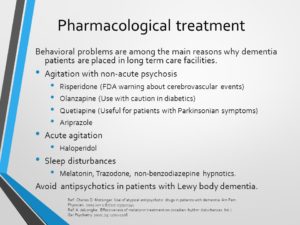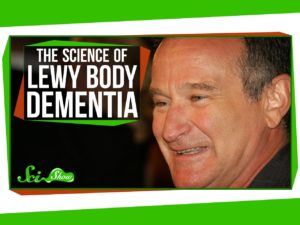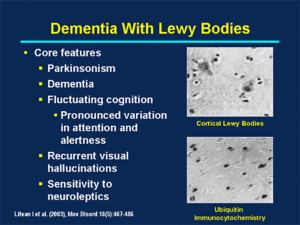
Behavioral problems are among the main reasons why dementia patients are placed in long term care facilities. Agitation with non-acute psychosis. Risperidone (FDA warning about cerebrovascular events) Olanzapine (Use with caution in diabetics) Quetiapine (Useful for patients with Parkinsonian symptoms) Ariprazole. Acute agitation. Haloperidol. Sleep disturbances. Melatonin, Trazodone, non-benzodiazepine hypnotics. Avoid antipsychotics in patients with Lewy body dementia. Ref: Charles D. Motsinger. Use of atypical antipsychotic drugs in patients with dementia. Am Fam Physician Jun 1;67(11): Ref: A. deLonghe. Effectiveness of melatonin treatment on circadian rhythm disturbances. Int J Ger Psychiatry 2010; 25:
Unfortunately at this present time there is NO cure or definitive treatment for Lewy Body Bementia. The disease has an average duration of 5 to 7 years. It is possible, though, for the time span to be anywhere from 2 to 20 years, depending on several factors, including the person’s overall health, age and severity of symptoms. REMEMBER there is an approach in treating the symptoms.
LBD is a multi-system disease and typically requires a comprehensive treatment approach, meaning a team of physicians from different specialties, who collaborate to provide optimum treatment of each symptom without worsening other LBD symptoms. It is important to remember that some people with LBD are extremely sensitive or may react negatively to certain medications used to treat Alzheimer’s or Parkinson’s in addition to certain over-the-counter medications just like other patients can do with with the meds they take for other diseases. All meds have side effects.
Cognitive Symptoms
Medications called cholinesterase inhibitors are considered the standard treatment for cognitive symptoms in LBD. These medications were developed to treat Alzheimer’s disease. However, some researchers believe that people with LBD may be even more responsive to these types of medications than those with Alzheimer’s. Remember Alzheimer’s disease are very similar to LBD symptoms.
Movement Symptoms
Movement symptoms may be treated with a Parkinson’s medication called levodopa, but if the symptoms are mild, it may be best to not treat them in order to avoid potential medication side-effects. Many are also diagnosed with Parkinson’s disease before being diagnosed with this Dx LBD.
Visual Hallucinations
If hallucinations are disruptive or upsetting, your physician may recommend a cautious trial of a newer antipsychotic medication. (Please see WARNING below. Of note, the dementia medications called cholinesterase inhibitors have also been shown to be effective in treating hallucinations and other psychiatric symptoms of LBD.
REM Sleep Behavior Disorder (RBD)
RBD can be quite responsive to treatment, so your physician may recommend a medication like melatonin and/or clonazepam.
Neuroleptic Sensitivity
Severe sensitivity to neuroleptics is common in LBD. Neuroleptics, also known as antipsychotics, are medications used to treat hallucinations or other serious mental disorders. While traditional antipsychotic medications (e.g. haloperidol) are commonly prescribed for individuals with Alzheimer’s with disruptive behavior, these medications can affect the brain of an individual with LBD differently, sometimes causing severe side effects (see below). For this reason, traditional antipsychotic medications like haloperidol should be avoided. Some newer ‘atypical’ antipsychotic medications like risperidone may also be problematic for someone with LBD. Quetiapine is preferred by some LBD experts. If quetiapine is not tolerated or is not helpful, clozapine should be considered, but requires ongoing blood tests to assure a rare but serious blood condition does not develop. Hallucinations must be treated very conservatively, using the lowest doses possible under careful observation for side effects.
WARNING:
Up to 50% of patients with LBD who are treated with any antipsychotic medication may experience severe neuroleptic sensitivity, such as worsening cognition, heavy sedation, increased or possibly irreversible parkinsonism, or symptoms resembling neuroleptic malignant syndrome (NMS), which can be fatal. (NMS causes severe fever, muscle rigidity and breakdown that can lead to kidney failure.)
Medication Side Effects
Speak with your doctor about possible side effects. The following drugs may cause sedation, motor impairment or confusion:
- Benzodiazepines, tranquilizers like diazepam and lorazepam
- Anticholinergics (antispasmodics), such as oxybutynin and glycopyrrolate
- Some surgical anesthetics
- Older antidepressants
- Certain over-the-counter medications, including diphenhydramine and dimenhydrinate.
- Some medications, like anticholinergics, amantadine and dopamine agonists, which help relieve parkinsonian symptoms, might increase confusion, delusions or hallucinations.
NOTE: Be sure to meet with your anesthesiologist in advance of any surgery to discuss medication sensitivities and risks unique to LBD. People with LBD often respond to certain anesthetics and surgery with acute states of confusion or delirium and may have a sudden significant drop in functional abilities, which may or may not be permanent.
Possible alternatives to general anesthesia include a spinal or regional block. These methods are less likely to result in postoperative confusion. If you are told to stop taking all medications prior to surgery, consult with your doctor to develop a plan for careful withdrawal but suggested as the last resort.
Non-Medical Treatments
Physical therapy options include cardiovascular, strengthening, and flexibility exercises, as well as gait training. Physicians may also recommend general physical fitness programs such as aerobic, strengthening, or water exercise.
Speech therapy may be helpful for low voice volume and poor enunciation. Speech therapy may also improve muscular strength and swallowing difficulties.
Occupational therapy may help maintain skills and promote function and independence. In addition to these forms of therapy and treatment, music and aroma therapy can also reduce anxiety and improve mood.
Individual and family psychotherapy can be useful for learning strategies to manage emotional and behavioral symptoms and to help make plans that address individual and family concerns about the future.
Support groups may be helpful for caregivers and persons with LBD to identify practical solutions to day-to-day frustrations, and to obtain emotional support from others.
End-of-Life
Planning for the end of life can be challenging and hard but a valuable activity for any family. For some general guidance and some specific suggestions for families who face the burden of a disease such as Lewy body dementia.
Advanced Directives – a Caring Connections site with state-specific advanced directives can be helpful in having measures answered before weeks to days to hours before last minute decisions in medical care have to be made.
Caring Connections – home page of consumer Web site about hospice and palliative care managed by the National Hospice and Palliative Care Organization This helps with weeks to days before pt moving on to the next world but in the most comfortable way possible.

